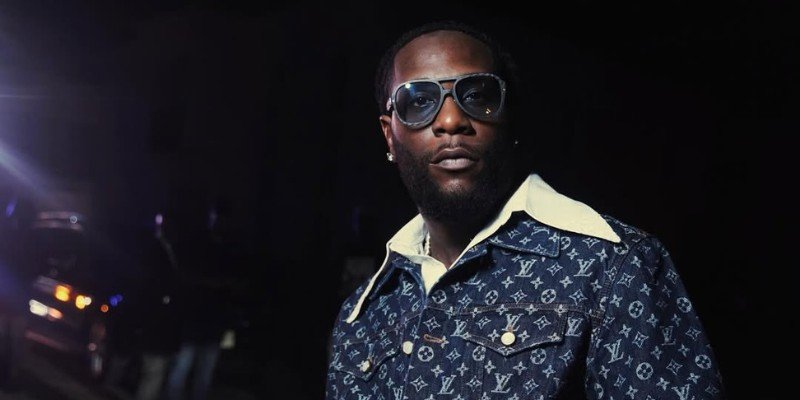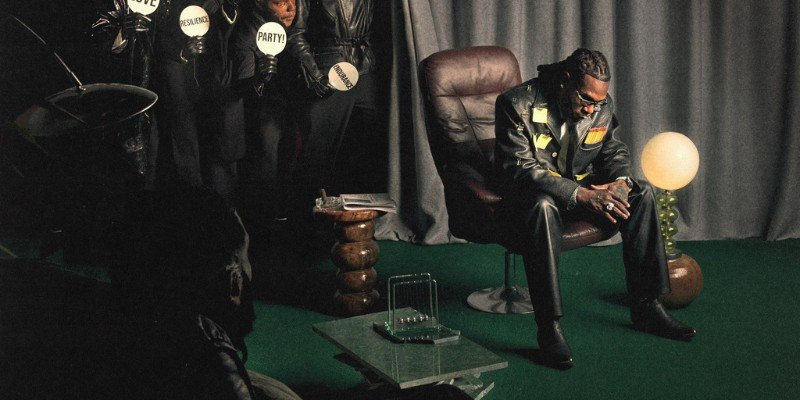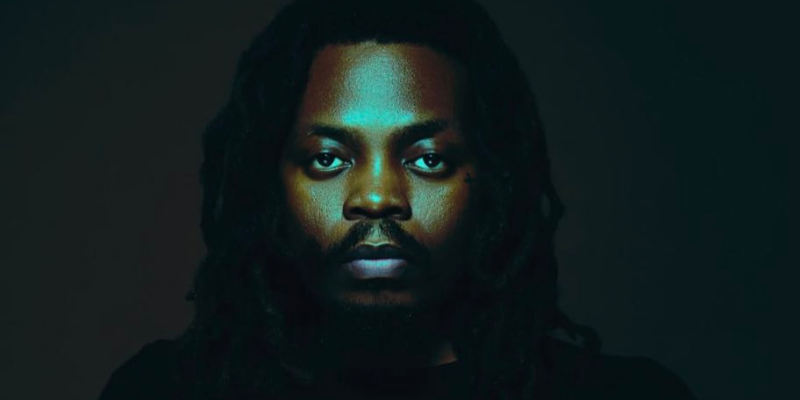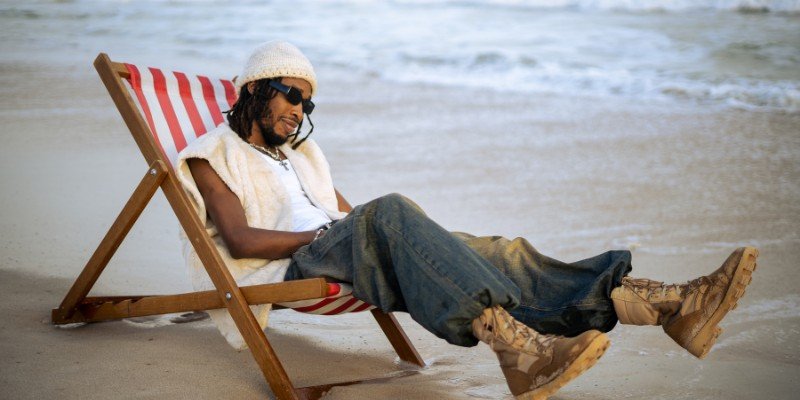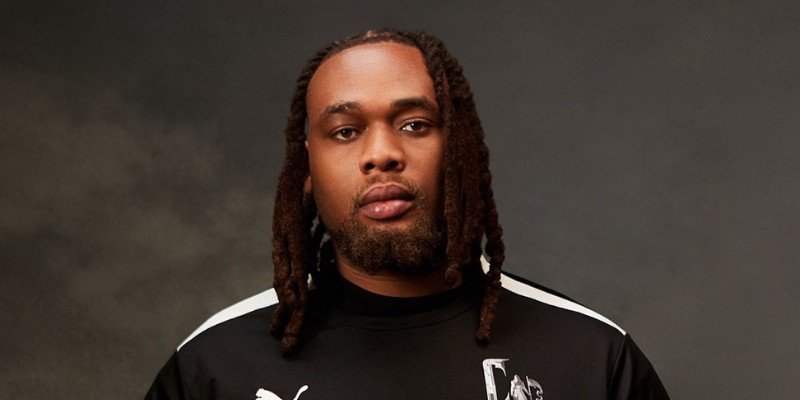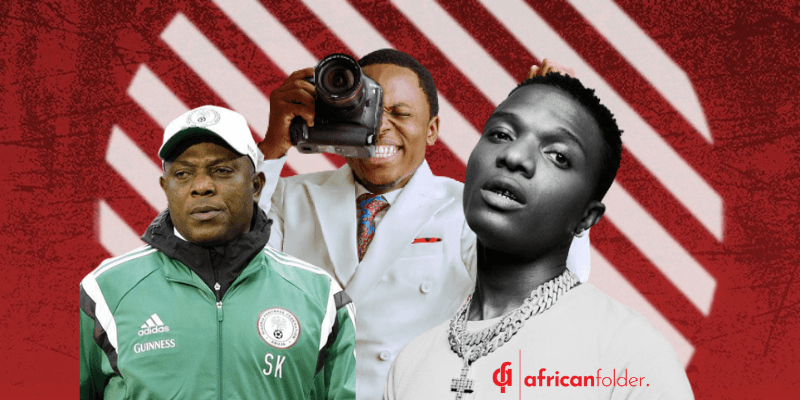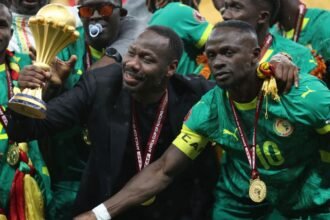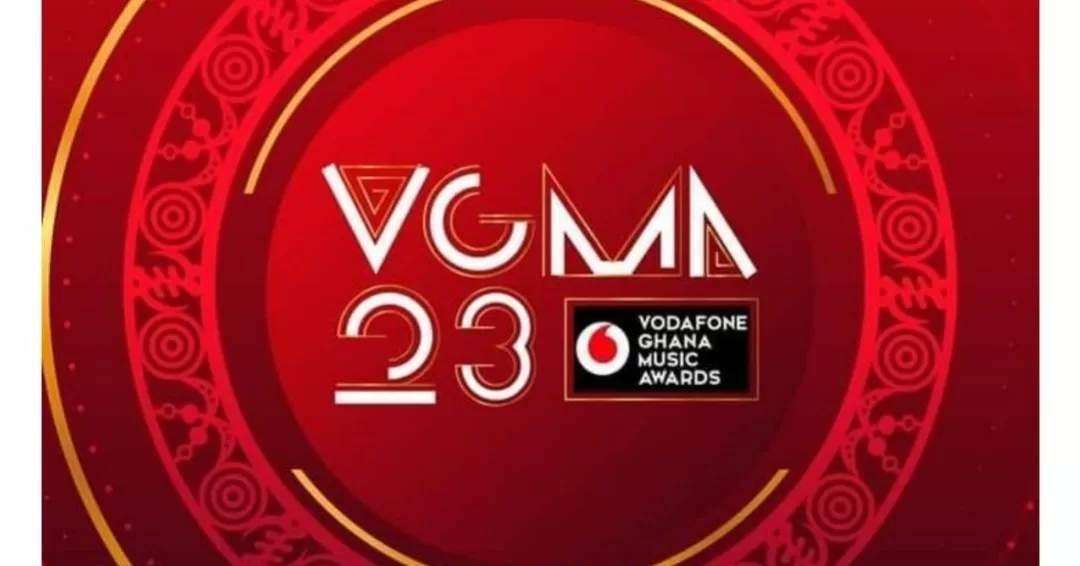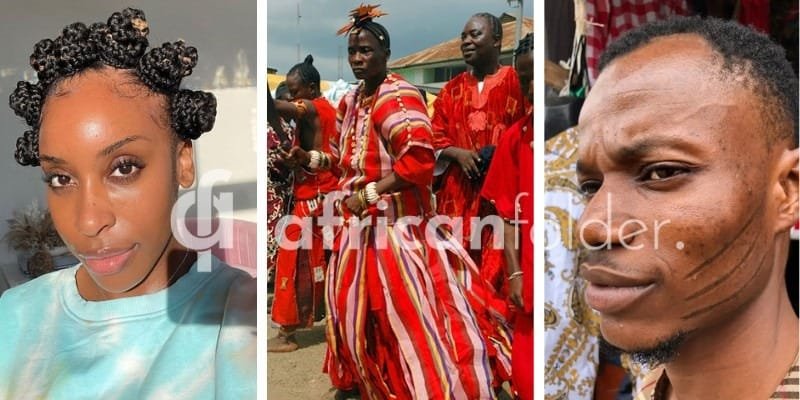When you consider the title of Burna Boy’s eighth studio album, No Sign of Weakness, a few ideas come to mind, especially when viewed through the lens of his career and personality.
On the surface, No Sign of Weakness is a mantra he lives by and an identity he embodies, as Burna Boy has always portrayed himself to be someone who refuses to fold or fit into any mould.
Defiance has long been one of his defining traits, and he’s made a name for himself by challenging institutions and not kowtowing to industry expectations.
From storming out of the Headies Awards—he hasn’t attended any since—after losing the Next Rated category to Sean Tizzle in 2013, to calling out Coachella for burying his name in microscopic font, to winning the Grammys with Twice As Tall after falling short the year before.
However, this defiance could also be a front, as beneath the commanding character he portrays, there seems to be a man who is in touch with his emotions and occasionally lets the mask slip to show emotional need.
Alternatively, this title could also be Burna Boy doubling down on his dominance at the top of the Afrobeats food chain. He is no longer the underdog; he is the most successful contemporary Nigerian act and quite easily the greatest of his generation. Globally, he sits on the same table as some of the biggest names in the world. If you ask DJ Akademiks, he’ll tell you Burna Boy is bigger than J. Cole, and he may not be incorrect.
On No Sign of Weakness, Burna Boy navigates the complexities of staying in touch with his emotions while projecting strength in a cutthroat world and music industry, all while maintaining a strong grip on his place as the undisputed Afrobeats champion of the world.
No Sign of weakness
On NSOW, the African Giant has a lot to get off his chest, and he does so explosively, lashing out at his critics, trolls, and detractors across multiple songs on the album. “Use Timberland match all of them / Or my brother blast one of them,” he sings on the menacing opening record, No Panic. On the cold-blooded battle cry powered by the dance-heavy core of soukous, he mocks his detractors and brushes off trolls, berating their limited financial means while flaunting his superior bank account. He embodies an unrepentant WWE heel, trash-talking his opponents and dishing out threats with reckless abandon without breaking character. His threats are brash, provocative, and even unsettling. “Them say I kidnap one of them / But I just dey laugh all of them / ‘Cause if I kidnap one of them / You no go ever see them again,” he sings, pushing his verse into dangerous boundaries as he seeks to drive home the depths of his frustrations with them. It’s nothing we haven’t heard before.
If No Panic was a battle cry meant to rally energy, he is war-ready on the title track No Sign of Weakness. Like a war general, his tone is restrained as he slides in and out of pocket on the punchy Hip-hop beat – A callback to the I Told Them era where he embraced his inner ’90s rapper, with lyrics that capture the haunting atmosphere of the Otis-produced anthem. “So my advice is that it’s just best you don’t speak / The likkle frog better not jump up and leap / The .44 gon’ make am slumber and sleep,” he raps, firing shots at an opponent the internet is deducing to be DMW head honcho Davido.
He does his best to sound threatening, but it’s a tame attempt. The violent imagery he paints sounds more disturbing than convincing. The songwriting on the record is surprisingly surface-level. This writer expected an introspective record that walks us through moments where Burna Boy could have shown vulnerability or backed down, but instead chose resilience. Even the brief monologue that opened the record seemed to position the song as a possible personal testimony where he reflects on inner battles, public pressure and the conscious decision to never appear soft. Unfortunately, in execution, the song doesn’t fully deliver on that setup. Burna leans heavily into braggadocio and threats.
For an artist who takes pride in writing his lyrics and has proven to have one of the most potent pens in Afrobeats, his songwriting on this record and in some parts of the album is on the surface and lacks the depth that has made his earlier works compelling.
Dem Dey transforms what could have been a potential weakness into a somewhat defiant display of defiance as he spins his most recent high-profile controversy into a groovy, club-ready anthem. “If you feel say I dey pompous / go to the bridge and jump off / Swallow the river,” he sings, finding a pocket to send a message to those who critique his character, despite the song being a celebration of his ability to play the cunning fellow in a bid to fulfil his sexual desires. It’s a shocking song that sees him revel in his bad behaviour and wear it like a badge of honour. Instead of rising above the scandal with grace, he chooses to flex, rubbing his ‘wisdom’ in the face of the person he played. The result is a catchy but somewhat childish record.
The man underneath
Interestingly, the most compelling records on No Sign of Weakness come when he steps away from the military position and reveals the man, despite how difficult it is for him to do so. “I be real General, so I can’t cry,” he sings on Empty Chairs, suggesting emotional boundaries he set for himself, making the moments when he does show vulnerability more meaningful.
On the sincere Sweet Love, he longs for a genuine human connection, putting down his shield completely. “Hold me in your arms tonight / And don’t leave me ’cause I won’t let go,” he sings on the moving Major Seven–produced Reggae record that reads like a late-night text to a love interest.
“I messed up, but I’m still here. Can we try again?” He sings on the country-inflected Change Your Mind featuring Shaboozey, showcasing his ability to be emotionally transparent when needed. He is remorseful, admitting to causing his love interest pain and hoping for another chance.
When he writes a love letter to marijuana on the Afropop and Reggae fusion 28 Grams, his delivery conveys the contentment of a man at peace in his clouds, with the beat designed to match the reflective and meditative mood of the record, seamlessly slotting into any stoner playlist. On Love, he reminds us that love is a mutual commitment. In a world full of opportunists, he chooses to reciprocate love only to those who show up when things get dark.
Genre hopping and Big Collaborations
Never one to be constrained by the confines of genre limits, Burna Boy embarks on significant genre-hopping on this album. Kabiyesi taps into Electronic and House music, reflecting a growing trend in Nigerian music as exemplified by records like Asake’s Uh Yeahh and Kizz Daniel’s Eyo. Update, which samples British music collective Soul II Soul’s 1989 classic Back To Life, cuts across Hip-hop, Soul, and Afrobeats. Released late in 2024 in the build-up to this album, the record—seemingly crafted to soundtrack Detty December—lacked the kinetic energy to truly move a home front he seems to be losing his grip on.
Buy You Life taps into the infectious sensibilities of Highlife music as he warns his listeners about the futility of chasing wealth at the expense of living in the now. It’s the most thought-provoking record on this album, delivered with honesty.
Come Gimme is Afroswing with R&B sensibilities that feels tailor-made for private after-hours but will reverberate in stadiums when he performs the record. He is unapologetically carnal, leaning into pleasure and intimacy as he tries to express his affection for his love interest.
However, this expressive display of range doesn’t do NSOW any good, as the album jumps between sounds and themes, making it difficult for a listener to grasp the central focus and sonic direction. Unlike his seventh album, I Told Them, where he leaned heavily into the ’90s Hip-hop and R&B he grew up on. While the album title presents a straightforward artistic statement, the music feels like a collection of a bunch of songs.
A reliable hitmaker in his own right, this album houses a handful of potential hit songs. The Travis Scott–assisted TaTaTa reflects a trend quickly gaining traction in Afrobeats, riding a Brazilian funk rhythm powered by heavy drums as the duo appreciates the aesthetic excellence of a woman’s backside. Even Dem Dey, in all of its childish glory, has hit song potential—especially in Nigeria. With Update unsurprisingly sailing under the radar and Bundle By Bundle turning out to be a huge fail, he would be hoping the eclectic fusion of Electronic elements and talking drums on Dem Dey connects with the Nigerian mass market. However, this writer’s best bet would be the Telz-produced Kabiyesi. While it doesn’t necessarily have the vibrancy of a record like Killin Dem, the song carries an infectious rhythm complemented by comprehensible writing that could make it an anthem.
Travis Scott is only one of the heavyweight collaborations on this album, as Burna continues to widen his international circle. Legendary Rolling Stones frontman Mick Jagger is featured on Empty Chairs, red-hot Nigerian-American country music star Shaboozey is a competent dance partner on the exceptional Change Your Mind, while Belgian rapper Stromae is featured on Pardon.
With these strategic collaborations, Burna continues to extend his tentacles to different demographics, expanding his already large global fan base. Travis Scott will help him continue to gain a foothold in South America, while Stromae consolidates Burna’s already strong presence in Europe. Shaboozey is the hottest country star in the world at the moment, and Change Your Mind has the musical excellence to become a hit, depending on the push it gets.
Does this album succeed or fail?
Ultimately, No Sign of Weakness is Burna Boy’s weakest album since 2015. While there are fleeting moments of the musical excellence that we have come to expect from the African Giant—Empty Chairs, Change Your Mind, Buy You Life, 28 Grams, Born Winner—the album in its entirety leaves much to be desired. NSOW explores a range of sounds and emotions but offers no thread to tie them together. The songs feel like they were all cut from different cloths and sewn together in hopes that the result would resemble the biblical Joseph’s cloak of many colours. Sadly, NSOW paints a confusing portrait and leaves the listener wondering what the album was supposed to be about. Burna Boy’s best works have a central narrative that the album is created around. You didn’t need to listen to African Giant for too long to find out what it was about. From the opening record, the album pitched itself as a politically charged body of work that blended Burna’s conviction with national commentary and maintained its ethos until the very end. NSOW fails to do that.
The album sequencing doesn’t do well to help matters. The placement of an energetic record like TaTaTa, which comes right after the emotionally charged Love, comes across to me as disruptive. The record would have served the album better if it had come in the second half of the album, especially since it was already released as a single. He sings passionately about offering intentional and mature affection to his love interest on one of the standout records, Sweet Love. This record comes right after the full-blown celebration that is Dem Dey, where he basks in the euphoria of his ability to pull a fast one on a woman. These contradictory personas make it difficult to take the album’s emotional claims seriously.
Is Burna Boy creatively exhausted? Maybe. But NSOW doesn’t feel like a victim of creative exhaustion. It just feels like a body of work put together because Burna Boy needs new songs to perform on tour. It lacks a central focus, the track listing wasn’t paid much attention to, and the sonic choices feel disjointed. That’s not creative exhaustion to me. It’s just shabby.







